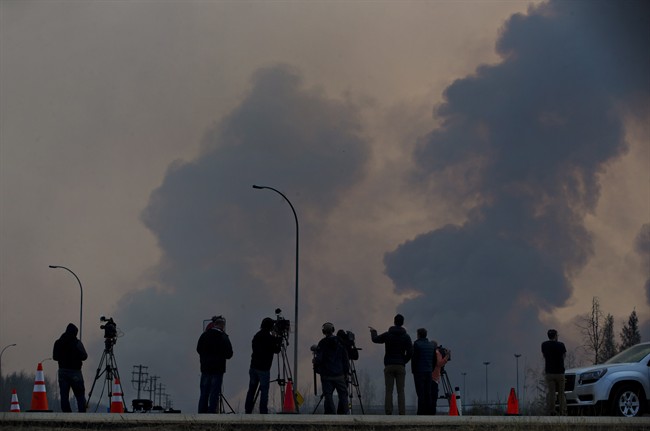CALGARY – The wildfire ripping through the Fort McMurray, Alta., area continued to set back Alberta’s crude industry Friday as concerns arose that the disaster may have taken out as much as half of Canada’s oilsands output.

It is difficult to say with certainty how much oilsands bitumen is offline because production levels have fluctuated throughout the week and companies have not disclosed precise figures.
But Nick Lupick, an oilsands analyst for AltaCorp Capital, said his latest estimate is that between 1.1 million and 1.25 million barrels of oil per day have been knocked from oilsands production.
The National Energy Board calculates that the oilsands sector produced about 2.5 million bpd in January and February.
While the oilsands sites themselves have been spared from damage, many of the workers who operate them have been forced from their homes without any idea when they’ll be able to return.
“The reality is that no physical damage has been done, as of now, to any projects,” Lupick said.
“It’s more about getting people back on their feet and allowing them time to recuperate before returning to work. That’s how long this is going to take.”
Watch below: Aerial footage shows the devastation in Fort McMurray’s Abasand and Beacon Hill neighbourhoods

On Friday afternoon, Syncrude Canada confirmed that it had closed its Aurora surface mine, about 70 kilometres northeast of Fort McMurray, but that it was continuing to operate its Mildred Lake mine, 35 kilometres north of the city, at a reduced capacity.
READ MORE: Syncrude employee furious over apparent request to return to work
“We’re focusing our operations to accommodate minimal staffing while maintaining safety,” said spokesman Will Gibson, who said production from Syncrude’s upgrader at Mildred Lake had been reduced but that he didn’t know by how much.
Suncor Energy said late Thursday night that it had closed both its Firebag and MacKay River thermal operations north of Fort McMurray. Those facilities produced about 237,000 bpd during the first quarter of this year.
Earlier this week, Suncor closed its upgrader and two related oilsands surface mines, also north of the community. The upgrader has a capacity of about 350,000 bpd but was operating at a lower level due to a planned maintenance shutdown prior to the fire.
READ MORE: Fort McMurray wildfire forces oilsands to scale back production
Suncor spokesman Paul Newmarch said Friday that he didn’t know when Suncor’s operations would return to normal.
Canada’s oilsands are considered the third-largest reserves of crude oil in the world. They are estimated to contain 166 billion barrels of recoverable oil covering 142,000 square kilometres — an area larger than the island of Newfoundland.


Comments